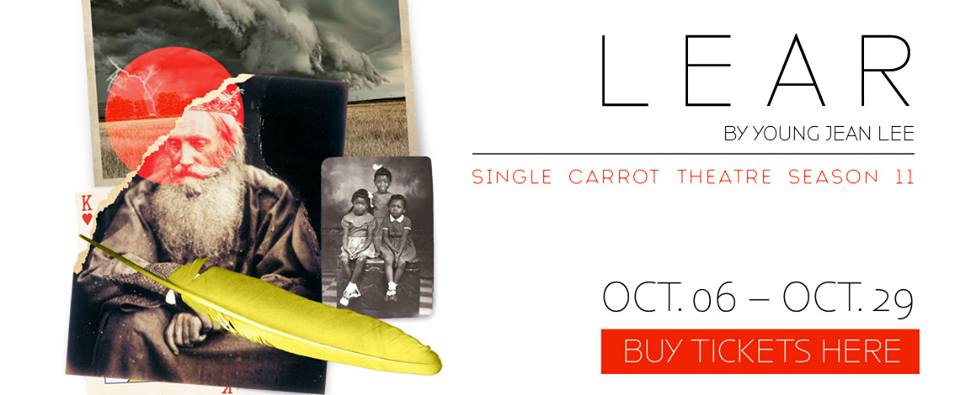People always find terrible ways to justify doing horrible things. But we enjoy watching horrible things; it gives us a feeling of immortality. We, however, are not immortal. Life is short. And the time that we spend with our loved ones is mostly behind us. Single Carrot Theatre opens their 11th season here in Baltimore with Young Jean Lee’s Lear, a peculiar exploration of familial dysfunction threaded loosely within the confines of Shakespeare’s King Lear. Directed by Andrew Peters, this curious theatrical exploration is geared toward a millennial audience; Lear’s daughters in this production bear striking behavioral similarities to The Kardashians. But there are some older popular culture references as well that situation themselves amid the performative chaos, broadening the target market of the production.

Aesthetically the show is mesmerizing. Scenic Designer Allison Campbell, Lighting Designer Helen García-Alton, and Properties Designer Alisa Glenn fabricate a timeless location of enchantment. A sweeping fabric tent encircles the three-quarter-thrust play space, with draped swathes of gauzy iridescent patterned fabric that dips down like a tent enclosure. García-Alton places a chandelabra— be-candled chandelier— at the center of Campbell’s tent, creating a mysteriously intriguing interior. Complimented by the regal thrones meticulously attended in their detailing by Glenn, the space is hypnotic. Campbell makes excellent use of the tiny cones, spiked like spires, atop the tent poles. They serve to remind the audience of the war that Lear’s daughters have waged upon him, but subtly blend into the background when the tones and even the happenings in the play progress away from Shakespeare’s home base.
García-Alton, who uses her intimate knowledge of how to light a space, plays well with the lowered ceiling of the stage and filters various flavors of illumination through the swathes of fabric, creating certain mood-effects on the room as various scenes occur. García-Alton’s lighting is particularly powerful at the end of the production when stars overtake the space, creating a profound and lasting impact to tie-in with the show’s conclusion.
The aesthetic approach to the production is tied together by House of Bankerd, designing elaborately fabulous wigs for Goneril, Regan, and Cordelia, and Costume Designer Nicki Seibert. The fanciful period gowns that adorn the three daughters of Lear are marvels in their own right and exude both affluence and beauty. The decadence in these gowns, as well as in the jewels and glimmer bits that adorn the highly manicured curls of the House of Bankerd wigs, transcends the insurmountable distance between Lear’s original temporal location and the present-day Kardashian-esque motif that playwright Young Jean Lee has imbued to Goneril, Regan, and Cordelia.
Lear is not one play, not merely a modernized adaptation or exploration of Shakespeare’s King Lear as the show’s description may imply. Young Jean Lee has effectively written three separate shows that don’t necessarily amalgamate into a cohesive piece of theatre despite sharing overarching themes and motifs. Attempting to bridge the gap between millennials— who may or may not have a working knowledge of the iconic late 80’s Sesame Street characters— with those in the audience who were raised on sunny days that swept the clouds away by making Big Bird and the a few of the other human-characters from the educational television program a joining segment between the portion of the play that addresses King Lear directly and the playwright’s direct message of cherishing time spent with loved ones, does not seem overtly clear in its functionality. While the Sesame Street inclusion is a touching memory, for those of its generation, and has a strong sentimentality, it comes so far out of left field from Shakespeare to the “MarySue-ism of self-insertion in the final scene, that it just feels bizarre and disjointed (even though it’s very humorous at the onset and deeply touching and moving by its conclusion.)
There are poignant moments all throughout the three mismatched pieces of Lee’s work, so much so that the work felt similar to many of the devised pieces that Single Carrot Theatre has created with their ensemble over their tenure in Charm City. Director Andrew Peters makes the best of attempting to keep a path of understanding clearly marked from start to finish and this is best experienced in the emotional strength of the performers. While the King Lear side of the script delves off into wicked territory, going completely bizarre and absurdist in text and nature by the time it’s drawing to a close, the performances witnessed are delivered at the peak of intensity. This makes the mellower segment of Sesame Street which follows feel like a cool towel after an intense stay in a Shakespearean-Kardashian sauna. Peters guides the cast of five through these mood swings that Lee has effectively drafted into the script, making for a thought-provoking theatrical experience, if nothing else. Peters even employs the use of Choreographer Nellie K. Glover to capture the dizzying essence of the production in a series of period-esque turns, twirls, and spins, all of which happen in the first segment of the piece.
Goneril (Surasree Das), Regan (Elizabeth Ung), and Cordelia (Chloe Mikala), like three Kardashian sisters, painted together in affluence and bitchy entitled attitudes, tackle the unusual place wherein Lear gets underway with tremendous bravado and an intensity that borders on campy caricature. Das and Ung are initially unaccompanied by Mikala, whose shocking arrival is both humorous and startling, but they hold their own when gnashing teeth through pleasantries at one another, later at Cordelia, and also with the boys. Das, whose disturbing slip in sanity at the end of the production, is frighteningly memorable, particularly once she dons the beard of Lear and goes all the way off the deep-end. Ung delivers a haunting speech, something of a nightmare-induced soliloquy that is strangely alluring yet cautionary. The pair do well when facing off and partnering up with the other three performers in the ensemble.
Chloe Mikala, as Cordelia, is a nightmarish creation all her own when it comes to delivering the dichotomy of Cordelia’s split personality. Deftly switching between the plastic serenity of cheer and kindness and the deeply disturbing rage and fury that is churning at the center of the character’s core, Mikala displays a tremendous amount of versatility, driving home her character’s intentions without having to rely on exasperating gestures of blast of volume to portray her anger, frustration, and ire. The scene where she verbally emasculates Edmund (Tim German) is brutal and stands your spine on its edge from her sheer force of will when spitting out the words.
German, who is one half of the “Bastard Brothers” duo in this production with Paul Diem as Edgar being the other, is more the central focus in the second and tertiary segment of the production than during the bits that focus more readily on King Lear. The same is true of Diem, whose primary importance is as a narrative figure that addresses the audience directly as the King Lear segment draws to a close before the Sesame Street segment opens. Diem embraces the softness and the simplicity of this truthful speech, sitting amid the audience members to give it a more personal touch. German, who gives a rousing homage performance as Big Bird, falls into his own individual self (intended to be the playwright) at the show’s conclusion and although the gesticulated mime performance (amid beautiful light work by García-Alton and striking sound selection from Sound Designer Connor Ciesil) feels estranged from the monologue delivered just prior to it, said monologue is truly stunning and utterly evocative.
On the whole, like all Single Carrot Theatre shows, Lear is an evening of evocative, provocative, and emotional experiences that leave you questioning, wondering, and conversing once the show has reached its conclusion.
Running Time: Approximately 85 minutes with no intermission
Lear plays through October 29, 2017 at Single Carrot Theatre— 2600 N. Howard Street in Baltimore, MD. For tickets call the box office at (443) 844-9253 or purchase them online.

